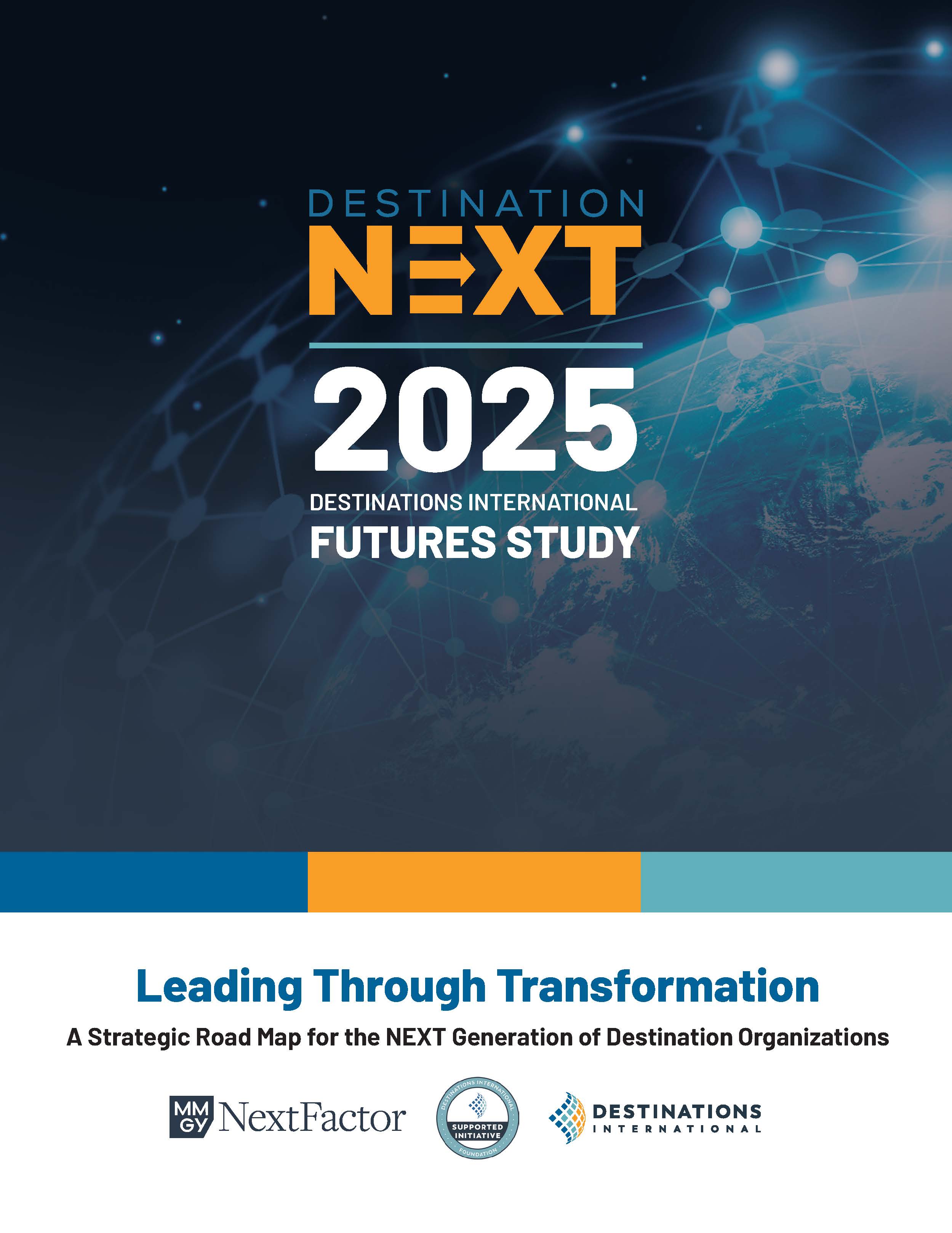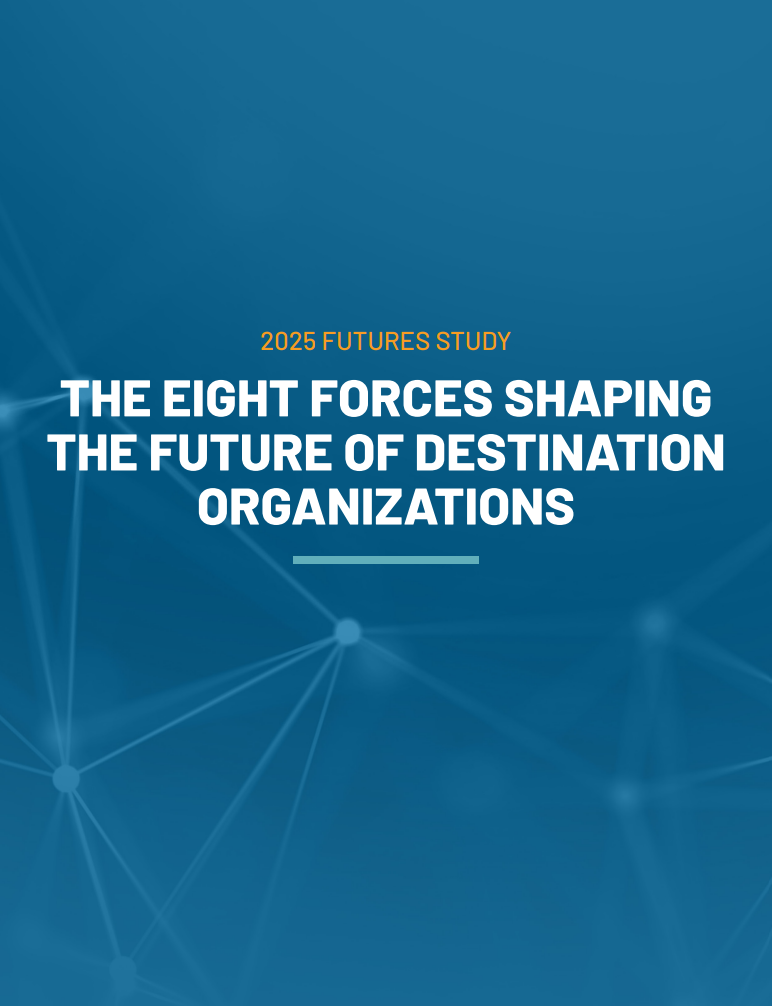
The 2025 DestinationNEXT Futures Study redefines marketing as a strategic mandate, not just messaging. Marketers must lead in advocacy, authenticity, community alignment and cross-sector storytelling to secure destination sustainability.
As marketing professionals in the destination space, we’re no strangers to transformation. But the 2025 DestinationNEXT Futures Study, produced in partnership with MMGY NextFactor and supported by the Destinations International Foundation, makes one thing undeniably clear – marketing is no longer just about the message, it’s about the mandate.
Every two years, the Futures Study provides a strategic lens into how destination organizations are evolving in a rapidly shifting world. This year’s study offers a powerful roadmap for what’s next. For marketers, it also signals a deeper shift from tactical campaign execution to organizational leadership, cross-sector storytelling and intentional community alignment.
Here’s what the latest findings mean for destination marketers and how we can lean into these opportunities.

1. Advocacy is Also a Marketing Function Now
Futures Study Themes: Securing Investment Through Advocacy & Scaling Organizational Capacity
A staggering 42% of destination organizations say their funding is at risk in the next three years. That’s not just a policy issue, it’s a communications issue too.
Marketing teams must help tell the full story of tourism’s impact not just in visitor spend or hotel nights, but in jobs created, small businesses supported and community wellbeing. The strongest campaigns now speak to residents, board members, stakeholders and elected officials, not just travelers. Good Marketing makes good advocacy work by providing engagement to multiple verticals and stakeholders within your community. See pages 15-16.
Marketing takeaway: Your brand narrative needs to reflect shared value, not just visitor appeal. Positioning your DMO as a public asset is part of the modern marketing brief.
2. AI is Here, But So Is Authenticity
Futures Study Theme: Reimagining Destination Marketing in the Age of AI and Authenticity
Yes, generative AI is reshaping the marketing landscape. It enables everything from multilingual content creation to itinerary brainstorming at scale. But while the tools are evolving, so are expectations.
Today’s travelers (especially younger, value-driven audiences) are craving authentic, human-centered stories. They want to see the heart of a place, told by its own community. As the report notes, content is increasingly co-created by locals, visitors and influencers, not just by destination organizations. See pages 23-24 of the study.
Marketing takeaway: AI is your co-pilot, not your copywriter. Use it to enhance speed and scale, but build brand strategies rooted in local voices, cultural nuance and lived experience.

3. Branding Is No Longer Just for Visitors
Futures Study Theme: Shaping Places for People and Prosperity
Destination marketing has long focused on external perception, but increasingly, internal brand alignment matters just as much. As DMOs expand their roles into placemaking and destination development, marketers are helping define what the destination means to residents and key stakeholders.
That means emphasizing local arts and culture, addressing accessibility and supporting community-first narratives that go beyond tourism. For more, see pages 21-22.
Marketing takeaway: Today’s most trusted destination brands are built with their communities, not just about them.
4. The Marketing Team of the Future Looks … Different
Futures Study Theme: Building a Future-Ready Industry Workforce
The scope of work for destination organizations is expanding and marketing teams must evolve alongside them. The study highlights the need for new capabilities, including data fluency, stakeholder engagement, content agility and a deep understanding of community dynamics.
Younger professionals want more than just a job – they want purpose, mentorship and connection. Marketers are uniquely positioned to build team culture, foster innovation and attract talent who believe in the broader mission of destination leadership. See pages 29-30.
Marketing takeaway: Your next campaign might come from your intern or an economic development partner. Build for flexibility. Collaborate across functions. Hire for curiosity, passion and empathy.
The Campaign is the Cause
The 2025 DestinationNEXT Futures Study underscores a central truth – destination marketing is no longer separate from community development, policy alignment or organizational sustainability. It’s all woven together. Marketing is the connector, the discipline that translates strategy into your story, bridges local insight with global relevance and helps define what success looks like across audiences.
For marketers, that’s both a privilege and a responsibility. And it’s a future worth leaning into.
Submit Your Thought Leadership

Share your thought leadership with the Destinations International team! Learn how to submit a case study, blog or other piece of content to DI.


